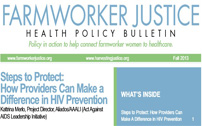This Miami Herald op-ed by labor historian Peter Cole argues against depriving agricultural workers of an important tool to enforce the minimum wage under the Fair Labor Standards Act of 1938. The U.S. Department of Labor may request a court to issue an injunction to stop the sale or shipment of goods produced in violation of the minimum wage, overtime, or child labor requirements. There are efforts in Congress to exclude agricultural workers from this protection; in addition a proposed Farm Bill would require the Labor Department to consult with the US Department of Agriculture regarding such "hot goods" injunctions; there is no valid justification for discriminating against farmworkers in this way regarding law enforcement. — Bruce Goldstein, Farmworker Justice.
Anyone care to return to the days of child labor? How about the times when employers did not have to pay a minimum wage or overtime? Assuming the answer is “no,” there is another, more obscure, portion of that same landmark federal law, the Fair Labor Standards Act (FLSA), that is at risk from large agricultural employers who do not want the government to use its power to ensure that minimum wages are paid to farmworkers.
Since 1938, the U.S. Department of Labor (DOL) has had the authority to investigate and remedy FLSA violations. When an employer is found to have engaged in wage theft or child labor, the DOL may ask a federal court to issue a ruling — called a “hot goods” injunction — to stop the shipment, delivery or sale of goods produced through such illegal means, until the employer complies with the law.
Thousands of Florida employees have benefitted from the protections in this enforcement tool. In 2010, the U.S. Department of Labor secured $173,000 in back wages for 153 South Florida citrus workers whose employers either missed payroll or failed to pay required overtime. The year prior, 49 employees of Miami-based Hoover Industries received $44,000 in back wages after the DOL intervened. Now this powerful, but fair, enforcement tool is under attack.
I’ve been told never to insult a farmer when your mouth is full. But many “farmers” today are corporate managers who never get their hands dirty. Florida agriculture produces about $9 billion in agricultural products a year, among the highest in the United States. It’s critical to the state economy. But the actual, hard work of planting, tending and harvesting food crops across the country is done by about 2 million men and women, mostly immigrants who get paid poorly.
Farmworkers are excluded from most labor protections and routinely find themselves exploited, not getting paid or paid the full amount they are owed. The real money is made by large corporations. We consumers contribute to this system because we want cheap food.
Some agribusinesses now want to erode one of the most important protections that farmworkers do have: the “hot goods” injunction that can force employers to live up to their obligation to pay the minimum wage. Unscrupulous employers hate this remedy because it can be so effective in getting workers paid fully and promptly; some have been agitating in the media, Congress, and the Obama administration to stop the Department of Labor from using it.
A provision in the farm bill now under consideration in the House of Representatives would require the DOL to “consult” with the U.S. Department of Agriculture about hot-goods injunctions. Traditionally USDA has been perceived as biased toward agricultural employers. Even more troubling is another House bill that would remove perishable agricultural commodities entirely from the provision for hot-goods injunctions.
There were good and noble reasons that the Roosevelt administration and Congress pushed for the passage of the FLSA. In explaining its importance FDR said, “Only goods which have been produced under conditions that meet the minimum standards of free labor shall be admitted into interstate commerce;” and that, “Goods produced under conditions which do not meet rudimentary standards of decency should be regarded as contraband and ought not to be allowed to pollute the channels of interstate commerce.”
The Fair Labor Standards Act was a product of compromises: in exchange for support among Southern Democrats who did not want any laws that protected the then largely African-American farm workforce, farmworkers were exempted from most of the protections afforded other workers. Not until years later were some federal protections, including the minimum wage, extended to them.
Most Americans take for granted that workers have basic protections on the job. As corporations become ever stronger, it comes as no surprise that some seek to eviscerate laws that limit their power and profits, like the hot-goods provision. Those of us who want the government to continue to be able to enforce the law need to oppose the below-the-radar efforts of agri-business lobbyists to have their allies in Congress strip away one of the few protections for farmworkers.
If we were to return to using child labor, employers would reduce their costs, but that is now considered unjust. So, too, should be the rampant exploitation of some of the most vulnerable workers in America. If you’re reading this piece while eating breakfast, it’s all the more reason to support the folks who make it possible.
Miami native Peter Cole is a professor of history at Western Illinois University, who specializes in 20th-century U.S. labor history. He is the author of Wobblies on the Waterfront: Interracial Unionism in Progressive-Era Philadelphia.
Read moreMiami Herald OpEd: Don’t weaken fair labor standards



